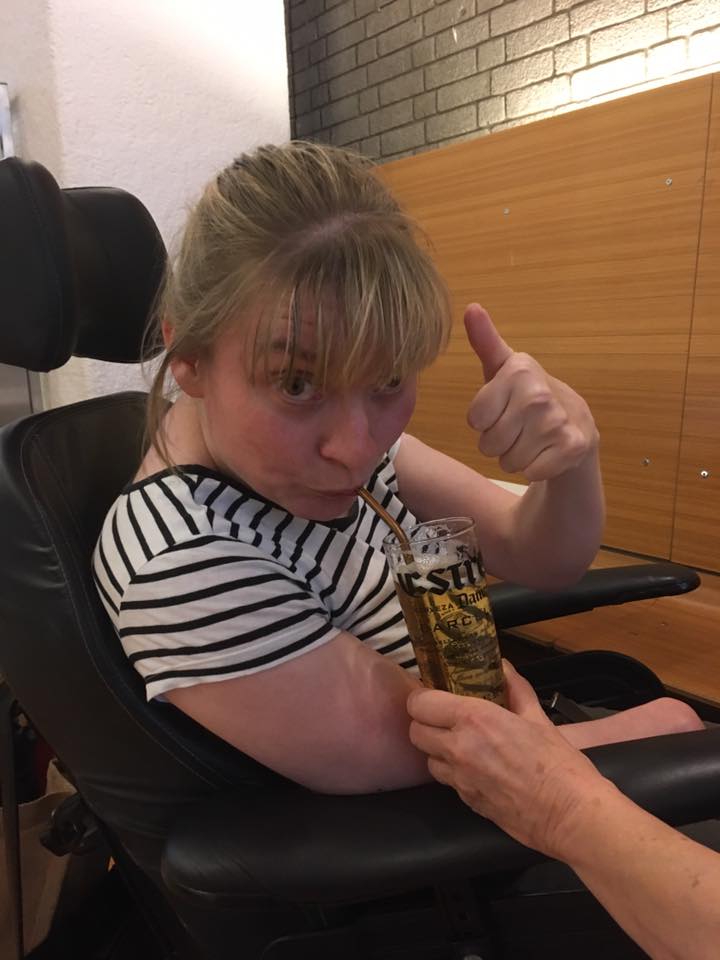Myth 1:
It’s tea break time at the day centre.
Tea with milk and two sugars all round, then?
Do any of the clients have coffee or juice?
None of them.
No, no, they all just have tea with milk and two sugars…
Do we?
I don’t. At least not all the time anyway. The odd double vodka and coke, or Pina Colada doesn’t go a miss.
It is a myth that disabled people don’t get drunk. We do wake up with hangovers and are sick in a bucket from the night before. It’s a sign of a good night.
Myth 2:
I’m talking to my friend who has severe cerebral palsy.
He is trapped inside his body: unable to speak, unable to move independently. As we sit here, together, an abundance of medication is circulating through his veins.
I watch his eyes rolling and wonder if am I boring him with my conversation. I wonder what he’s thinking.
Then from nowhere he started to laugh. A proper belly laugh – bursting out from this man, who doesn’t usually make a sound. As my body shakes, I can sense the tremendous effort it takes for him to laugh. It’s like the force of it is overpowering the medication, overpowering the entrapment of his body – as if he was going to jump out of his wheelchair. It was beautiful.
He couldn’t tell me what he was laughing at, of course, but this doesn’t matter at first. We just laugh and laugh and laugh… and then my carer realised her bosom was falling out. He was now crying with laughter. By this time, we all were.
Playboy calendar for Christmas it is then.
It is a myth that disabled people don’t desire sex. We do have feelings of sexual attraction, to the opposite sex, or otherwise. It is a myth that disabled people don’t want, or need, or can’t have a relationship, whether that partner be able-bodied or disabled.
Myth 3:
I’m crying in the car.
I’d just done yet another, typical super-market run. She was looking for a more accessible car for her daughter. I wasn’t quite prepared for what she would say, or how it would make me feel.
Somehow, we got onto the topic of her daughter’s life. She told me that, at the age of 40, she had met her husband at a day centre – and now they were expecting a baby. She spoke with such pride, such love. I felt my body light up with her, like she had made me aware of a switch inside of me – a switch that turns a trip to the supermarket, into a moment of realisation. Hope.
I’m crying in the car, thinking about my niece and nephews – how I want to squeeze them tightly, never let them go. That’s what we do. They know they can always come to me for a good old squeeze.
I’m crying in the car because I want that woman’s daughter’s happy ending.
I’m crying because life can be beautiful, disability or not.
It is a myth that disabled people don’t want, can’t have, or don’t desire to have their own children. It is also a myth that they can’t be good parents.
Myth 4:
I’m trying to keep my graduation cap on my head.
It’s hard enough at the best of times to hold up the weight of my head. It’s become a bit of an in-joke for my family. They are heavy these heads, aren’t they?
Quick, take it now! The camera flash comes, I desperately try to look in the right direction. Over there, over there – straight! It slips again, though, this truant hat.
My mind jumps back to getting ready earlier. It was like trying to get a sock on an ironing board. There were four people trying to pull me in – but my body had other ideas. Involuntary spasms make me pull away, arms flying around everywhere.
I don’t know what was harder: getting the HND (with distinction, I might add) or getting the graduation gown on.
But I made it.
Three years of work had come down to this. And my hat just wouldn’t stay up. I couldn’t stop laughing.
I’m in uncontrollable fits of laughter, thinking about the irony of the fact that I put blood, sweat and tears into that course and now I’m surrounded by a very sweaty bunch of men who have just had to pull me and my wheelchair up on to the stage.
But there I was, surrounded by 200 or so other students, thinking: well Hannah, this isn’t bad, considering no one thought you would be able to read.
It is a myth that severely disabled people can’t achieve academic success, or even have a job or role within society, paid or unpaid. I may not go to work, but I work very hard every day – and I’ll never stop. I have my HND in the bag, but now I’m doing my BA.
Myth 5:
I’m taking Bella for a walk.
She’s tied to my wheelchair and, as always, she is trotting alongside me at the same pace. She’s very insistent: she stays with me.
As if on cue, the two old ladies that live on my estate make an appearance. I sigh. Here we go again.
Their voices travel down the path, a sound that is unexplainably annoying – just imagine something that you really, really want to switch off.
Unfortunately, I can’t though and they approach me. Bella barks protectively and instead of calming her down, I secretly wish she would get louder.
These two women have known me since I have moved over here and yet they greet me with the same patronising tones every day. It doesn’t get less insulting.
Aww isn’t she lovely, they say, as they stroke my hand or pat me on the head. I suppress a scream. I’m boiling over inside and all I want to say, to shout back at them is:
Fuck off, my names not ‘Rover’ and I don’t have four legs. If you want to pat a dog – Bella is right there. My name is ‘Hannah’ and I just happen to be physically disabled and need to travel around on four wheels.
But I don’t. I simply turn my head away and smile.
It’s a myth that we can’t be talked to like human beings, that we can’t hear or comprehend what is said to us, or about us. I’m perfectly capable of forming a sentence. Especially one with expletives.
Myth 6:
It’s Christmas and I’m sat at a dinner table, surrounded by my extended family.
Did it hurt? Was the first question. Not as much as physio does, I think to myself. Where did you have it done? Someone else asks. I laugh inwardly at the thought of me being held down by my support worker, in this place where wheelchairs have probably been a rare sight. Are you going to show us it or what? They all turn to look at me, as my rather conservative Mother pipes up: She was probably drunk when she had it done.
We all begin to laugh, my dad hiding his face in his jumper and avoiding the eyeline of his not-very-impressed wife.
When had I first showed it to them, a few months ago, my mum just stood there, open-mouthed. Speechless. She looked at the carer on duty in horror, who simply said well its Hannah’s choice, to which my mum replied it certainly is. I remember thinking I could see she was suppressing a smile.
This first one was a pawprint on my hip, Bella’s paw. The second, a graduation cap with the quote ‘I did it my way’. The third, is a sailboat. I bet no one can guess the story there.
When I finally replied to everyone’s questions that Christmas, I simply said: ‘my body is broken anyway, it’s of no use to me, so I may as well decorate it’. To which my mum’s eyes filled with tears.
It’s a myth that disabled people don’t have tattoos. I have three and they are just as much, or even more of, a part of my identity than the chair that I sit in is.
But
It is a myth that the pain of living with a disability only runs skin deep.
Sometimes I think about the needle that drew my tattoos. I think about it going right under the skin and I wonder about that pain. When I do the ink runs into images of struggle, of the constant fight to control the boat lost at sea that is my body.
My body is broken, I am in pain, this decoration can never take that away.
It’s a myth that I can always bite my lip, suppress the scream. Sometimes I do lose it, I swear and I shout.
It’s a myth that I can always laugh. The scream is always there too.
The cap falling is matched with the soreness of my neck, the ache in my limbs, only worsened by the contraction of my muscles as I laugh.
The boob falling out of the top is matched with the pain I know he is feeling – because I am feeling it too.
It’s a myth that I can always feel hopeful, that the tears I cry always lead me to light. The woman’s daughter, her husband, her baby, appeared to me like a mountain, a summit, that I couldn’t possibly reach.
And no matter how hard, or how far I climb, it always comes back to the bright, oppressive lights of the day centre.
It always comes back to that question: coffee or juice.
But
I refuse to be defined by the myths that misunderstand me.
I may cry, I may scream but I also laugh, I also drink, I also dream.
I will continue to write, to speak, for those that can’t


